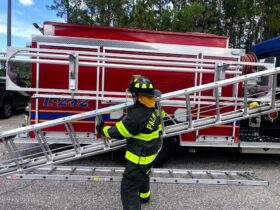The health risks of fires and the possibility of future evacuations of western campuses

California is currently being ravaged by a storm of fires, which have swept over 771,000 acres since August 15th. Their origin was the epidemic of dry lightning storms, which sent some 11,000 bolts to ground, sending fires racing through tinder-dry forests and parched grasslands. Though the fires center in the San Francisco area, blazes are also raging near Palo Alto and Sacramento. The smoke produced has blanketed the entire West Coast of the United States, and has even wafted into Canada, with both British Columbia and Alberta reporting very poor air quality. With a recent evacuation of the University of California Santa Cruz (UCSC), Unemployed Professors wants to educate students on the health risks these fires impose, and on the possibility of future evacuations of western campuses.
Last month, UCSC evacuated in the face of raging wildfires at its periphery. Though the Bay Area fire did not actually encroach on the campus, students and staff were evacuated August 20th, only a month prior to projected opening. At the time of the fire, some 1,200 people were living on campus. UC Davis was not similarly threatened; however, a field research station positioned 30 miles distant from the campus was engulfed in flames. Currently, there are many fast-moving, very large, and destructive fires which are simultaneously burning. Climate scientists all confirm that there has been nothing in living memory which compares to this scale of environmental destruction.
The fires come with enormous infrastructure and health costs. Wildfire smoke can, in extreme cases, be fatal. Scientific studies confirm that when the dense wildfire smoke closes in on communities, hospitalizations skyrocket with a predominant pattern of respiratory problems, heart attacks, and strokes. Moreover, the current situation in California cannot properly be evaluated in isolation from the problems imposed by the coronavirus. Indeed, the coronavirus pandemic imposes greater risk on an already dangerous situation. The Centers for Disease Control and Prevention have issued statements that confirm patients with COVID-19 are at increased risk from wildfire smoke. Additionally, runoff from burned homes leeches damaging chemicals into groundwater and reservoirs; and plastics that have burned can produce benzenes and other dangerous chemicals which can pollute water systems.
Given the peril of the current situation, and the UCSC evacuation we must confront the reality that students are at risk of health problems; and this is especially true during the coronavirus epidemic. Indeed, since the respiratory system of COVID-19 patients is often compromised, the further damage to respiration imposed by smoke should be a special concern to universities located near current wildfires. We urge students in the vicinity of such fires to remain indoors with windows and doors closed, to avoid physical exertion, to run the air conditioner with a clean filter, and to use the recirculate mode, if possible. Additionally, students should frequently check university websites for current updates on the progress of fires, and the potential risk of evacuation.
With that in mind, ask the team of academic professionals at UnemployedProfessors.com any questions you may have regarding their college writing services and they will be more than happy to guide you along the arduous path!












